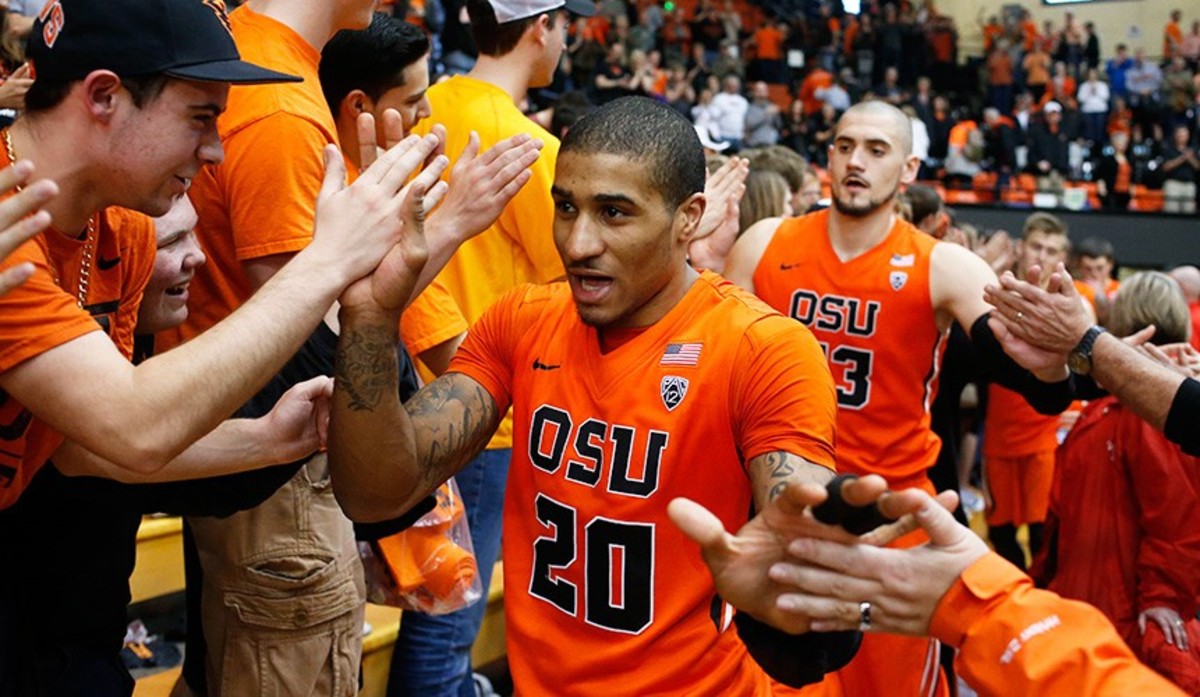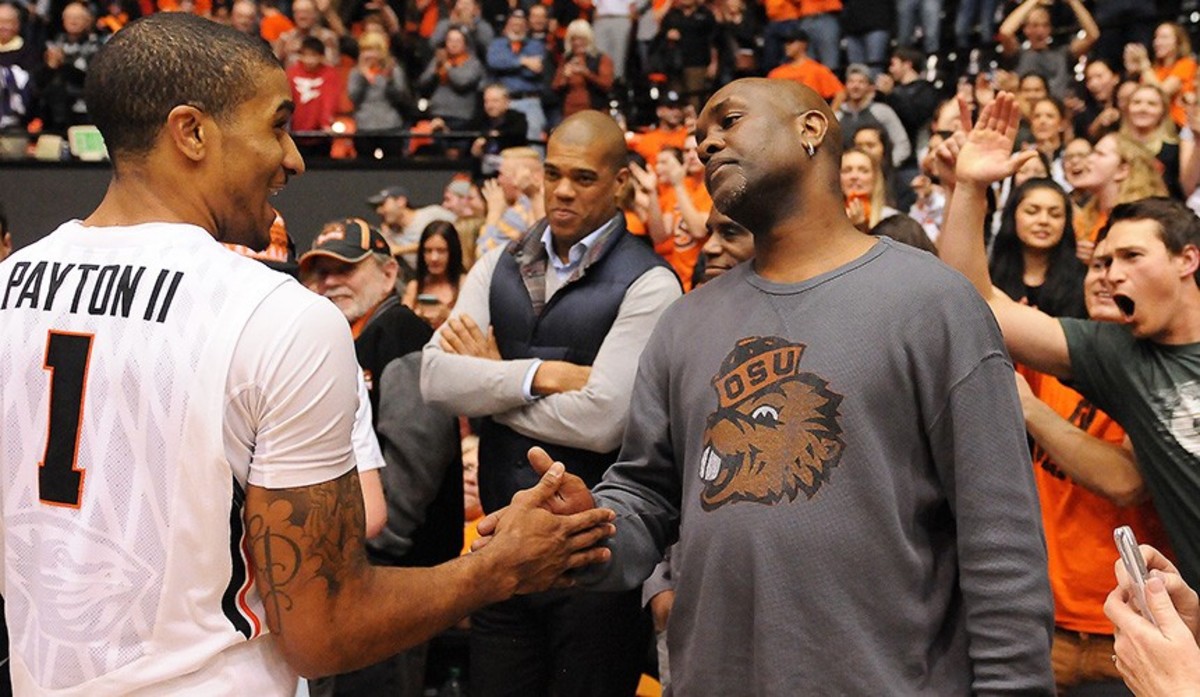Glove Story II: How an ultimatum from his Hall of Fame father helped make Gary Payton II a star

This story originally appeared in the Feb. 29, 2016, issue of Sports Illustrated. It has been updated to reflect the most recent information. Subscribe to the magazine here.
For two weeks over the past two summers the father, the son and the basketball trainer took over the gym of a community college in Oakland's eastern hills. Every morning the father sat in a folding chair behind the royal blue baseline, watching the son fly up and down the court as the trainer put him through one drill after another, barely a breath between each. Medicine ball slides gave way to diagonal backpedaling, punctuated by a drive to the basket. A mock fast break one way set up a push toward a transition jumper in the other. The effect was a blurring procession of concussive dribbles, hard grunts and swooshing nets until the father called a halt. "Hold up, man!" Gary Payton would shout in the Merritt College gym. "He's gotta do it again." Then the son, Gary II, would repeat the drill with an ardor and urgency worthy of the hoops culture that shaped the father.
Gary Payton grew up in East Oakland. As a boy, that meant concrete schoolyards on gang-ruled turf; at Skyline High it meant thriving in the rowdy gyms of the Oakland Athletic League, which often needed a police presence to keep order. Learning to play point guard in those environments instilled a ferocity in Payton that drove him so far—to nine NBA All-Star Games, nine figures in career earnings and a Hall of Fame enshrinement—that he would raise Gary II in a different world. Says the 47-year-old Payton, "He always had a silver spoon in his mouth because of me."
"Gary wanted him to come home and smell some of that inner-city air," says the trainer, former Nuggets assistant Chris Farr, "to see if he could turn into what we think he could turn into."
That air carried the father to stardom at Oregon State, where he was the Pac-10's defensive player of the year in 1987 and the overall POY in '90, and where now the son is taking his own turn as leading man. A senior, Gary II is a 6'3" point guard of such superb versatility—15.8 points, 7.7 rebounds, 5.3 assists and 2.6 steals per game—that he remains in the thick of the Pac-12 player of the year race despite the Beavers' seventh-place standing. "He's just as impactful as anybody else," says Pac-12 Network analyst Lamar Hurd. "And he's the most indispensable of any guy on any team."
Despite the parallels of role and school, Gary II is no clone. The father was a prolific passer who chipped in on the boards; the son's defensive rebound rate (17.6%) ranks first among conference guards. Both are distinguished thieves—the father remains Oregon State's career steals leader—but the elder Payton describes his son as "more of a gambler," a passing-lane pest in coach Wayne Tinkle's frequent zones. And while the father threw down on occasion, the son's dunks—like his soaring, driving slam from the right block against Kansas on Dec. 12, or his transition posterization of Oregon's 6'10" Chris Boucher on Jan. 3—are staples of the college hoops Twitterverse. "I don't know where he gets that from," says the elder Payton, who's 6'4". "I'm like, Is that my son?"
Yet a few years ago the need for any comparison seemed unlikely. "His journey was long," Gary II's mother, Monique Payton, says of her middle child. "He had to crawl his way." And for much of his youth, being the son of Gary Payton made Gary II reluctant to embark on the journey at all.
*****

Timothy J. Gonzalez/AP
If Gary Payton was the king of Seattle's KeyArena in the 1990s, Gary II was its prince. As a grade-schooler he had free rein of its corridors, giggling past guards who knew him by name. He rebounded during the SuperSonics' shootarounds, then distributed towels and water on their bench. In the visitors' locker room he hobnobbed with Vince Carter and Kevin Garnett. He was even there—alongside a hired violinist and Squatch, the team's hirsute mascot—when his parents were engaged during an off-hours dinner at midcourt. "KeyArena is where I grew up," Gary II says. "It's pretty much my home."
On the court Gary II watched his father—the Glove—mean-mug while smothering opponents, talking so much trash that a teammate once said Payton would only quiet down "about two months after he's dead." At home he was a no-nonsense stickler, an heir to his own father's Mr. Mean nickname. Gary II, who preferred hugs to confrontation, took after Monique, whose friends called him her little twin. "We're lovers, not fighters," she says.
Despite the NBA immersion, basketball did not come naturally to Gary II. Classmates were harsh when he failed to star in pickup games, needling him about his father and asking if he were adopted. "That kind of pushed me away from the game," he says. He continued to play but preferred baseball and football and even tried water polo. He gravitated to hobbies like dirt-biking and paintball. He was interested in marine biology.
By ninth grade, with his father's playing career winding down and the family settled in Las Vegas, Gary II was a gawky benchwarmer on his AAU team. He and his father rarely discussed hoops and almost never the son's play. When Gary would attend Gary II's games, he barked advice so vehemently that his son asked him to stop coming. "I didn't know how to handle it," Gary II says. "I would go back and tell my mom that I didn't want to play anymore." He made the freshman team at Spring Valley High, then jayvee as a sophomore, but didn't enjoy himself. "I just played because my friends played," Gary II says. "I was just out there."
Even after making varsity his junior year, little changed. When his father attended one early-season game, he was appalled to see his son coasting on the court. He stood up and walked out. "I didn't see the passion," says the elder Payton. "He didn't look like he was interested, so I said, Well, I'm not interested."
At home a few days later, the Payton patriarch sat Gary II down and delivered an ultimatum: If he was going to attend college, he would need to earn a scholarship. And—his father continued—he wasn't a good enough player to do so. "It kind of hurt," says Gary II, "but it was a reality check." Later that week, as he mulled over the conversation, a new outlook took hold. "I said, Why not?" Gary II says. "Let's try it his way and work out and see where it takes us."
As his junior season progressed, Gary II began putting in extra practice. He improved his footwork and fundamentals with Darrel Jordan, a family friend who coached the youngest Payton brother, Julian, in AAU. By the time Spring Valley made the state playoffs, Gary II was an emerging sixth man supporting an all-senior lineup. "His instincts for the game were second to none," says Phil McAlister, then Spring Valley's coach. "He was turning into a serious player."
The following summer, while playing for an AAU team of Jordan's, Payton chased morning conditioning drills with afternoon practices and nightly shooting sessions. He played in adult leagues at the Tarkanian Basketball Academy. He lifted weights, surprising himself with his newfound dunking ability. He wolfed down peanut-butter sandwiches to pack on pounds.
"He just blossomed," McAlister says. "He took ownership of his game and who he was, and became an incredible player. He grew, and all of a sudden he was jumping out of the gym." The next winter Gary II defended opposing big men while starring alongside four underclass guards. "You could count on 15 points and 10 boards every night," adds McAlister. "He was the straw that stirred our drink, no doubt about it."
Still, few colleges took notice. After a year at Westwind Prep in Phoenix, where he grew to 6'3", Payton enrolled at Salt Lake Community College, a school with more than 30,000 students and a juco program regularly among the best in the Scenic West conference. Among his teammates were JuWan Buchanan (nephew of his father's Seattle running mate, Shawn Kemp)and Tyrell Corbin (son of then Jazz coach Tyrone). But at first Gary II played down his NBA pedigree. He asked to be called Dwayne, his middle name, until a P.A. announcer didn't get the memo. He winced when local media called him the Mitten.
The more his game improved, the more comfortable he got in his own skin. He dissected his play with his father, who gave tips for exploiting the seams of a defense and implored him to ramp up his aggressiveness as a scorer. He was happy when his father would make one of his 10 or so trips to Bruin Arena. On the road, when fans would heckle—"Your dad never played juco!"—he would laugh.
As a freshman Payton started as a wing, displaying enough promise that D-I recruiters blew up his phone. Each pitch hit a familiar note: Come here and build your own legacy. In October of his sophomore season, Payton was ready to commit to St. Mary's until he took a visit to Oregon State, where he attended a football game and tailgated with then coach Craig Robinson. Some friends and family warned him about the pressures that would await in Corvallis. His parents, who had divorced a few years earlier, told him to go wherever he would be happiest.
Back in Salt Lake, Gary II realized he wanted the challenge of playing at his dad's alma mater. He composed a long text message to his family explaining his decision. He signed it, "Go Beavs." Lying in bed at his home in Los Angeles, his father's eyes welled with pride.
*****

Icon Sportswire via AP
Twenty minutes after the final horn, Gill Coliseum's roar has died down following a wild, 71–69 win over Utah on Feb. 4. Gary Payton II was the game's star, with 20 points, six rebounds and seven assists, including setting up the go-ahead basket with 13 seconds left. His father spent the night first as a demonstrative courtside spectator, challenging officials and shouting pointers, then slipping back into his role as returning hero, posing for photos with orange-clad undergrads and well-wishers. "It's a great feeling—it's all in here," he says, tapping his chest, when asked about the pride he takes in his son's success. "Everybody says I don't ever smile. I don't wanna smile until something's accomplished."
Twenty-six years have passed since Payton last played in Corvallis, a gap that doubles as the Beavers' NCAA tournament drought. They have had just three winning seasons in that span, one of which came last year, a 17–14 finish in the first season for Gary II and Tinkle. Hailed by Robinson as a "glue guy" when he committed, Gary II instead became the team's centerpiece, earning Pac-12 defensive player of the year honors and leading the nation in steal percentage (5.5%; this year his 4.2% ranks 14th). By season's end he was receiving buzz as a possible second-round NBA draft pick.
He returned to school in part to try to lead Oregon State to the Big Dance, a task that will likely require the 17–10 team to get a few good wins in the conference tournament. A banner in Gill displays a monochrome image from an era where such bids were regular: the elder Payton, neck draped in a trimmed net, wearing a told-you-so stare. During a postpractice interview Gary II's eyes repeatedly wander in its direction; another larger-than-life likeness of his father, open-mouthed and dribbling with his right hand like an inverted NBA logo, is painted among a mural of Beavers greats on an adjacent wall. "He's everywhere in this town," Gary II says.
And when the son sees the father, he looks up, not away.
